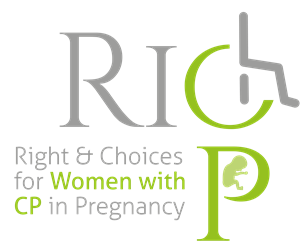Rights and Choices for women with cerebral palsy (RICH)
A qualitative study to understand what works in the provision of their maternity care.

Research Aim
To find out about the reproductive choices and experiences of women with cerebral palsy during pregnancy, childbirth and the postnatal period.
Background
Women with cerebral palsy are a growing group. for approximately 10% of women with impairments giving birth in the UK. They are entitled to the same rights and choices as non-disabled women in terms of whether, when and how they have children. However, multilevel barriers are encountered when seeking access to appropriate maternity care and informed reproductive choice it is not always available. Existing evidence highlights inequalities and barriers faced by disabled women during pregnancy and childbirth, but the unique experiences of women with CP remain underexplored.
Objectives
-
Retrospective Interviews: Conduct in-depth interviews to explore the reproductive choices and experiences of care and support for women with cerebral palsy who have experienced pregnancy within the past five years. This includes experiences of loss in pregnancy or childbirth, and the kind of support and choices presented to women with CP.
-
Online Survey for labour suites and maternity wards: Collect survey data about the provisions available in maternity and birthing units, for disabled women across the UK.
-
Focus groups with health care professionals: Conduct 5 Focus Group discussions with healthcare professionals to gain insights into their experiences of providing care to women with CP during pregnancy, childbirth, and the postnatal period. Identify common perspectives on optimal maternity care from both women with CP and healthcare professionals
-
Recommendations: Collaborate with our project-specific Public Involvement group to co-produce recommendations for enhancing maternity service policies and provisions for women with CP.
-
Develop new resources: Develop a set of empirically-grounded resources showcasing best practices in maternity care, informed by the views of women with CP and healthcare professionals
Impact and Research Benefit
This research strives to shed light on the often-overlooked choices and experiences of women with CP during their reproductive journey - specifically when considering pregnancy, during pregnancy, during childbirth, and while bringing up a baby. By understanding women’s needs, choices, and challenges, the study aims to inform healthcare policy, medical practice, and public awareness. Improved guidelines and resources will enable healthcare professionals to better support women with CP (and disabled women in general) during pregnancy, childbirth, and postnatal care. Additionally, the project contributes to the larger conversation on disability rights, gender equality, and inclusive healthcare services. Through collaborative efforts, this research aims to create positive change and offer women with CP a more informed and empowering reproductive journey.
Resources
These are some of the resources produced as part of the NIHR research project, RIghts and CHoices. They were co-produced with women with cerebral palsy experiencing maternity care in the UK, Scope Charity, and the RICH PPI group.
The resources were developed by ScienceSplained.
Video
Poster for practitioners
Advising women with CP about Maternity Care
Infographic
RICH project infographic
Public Involvement
Facebook PPI Advisory Group
The 6 advisory group members advise on the design and direction of the study via the closed Facebook group ‘Pregnancy and CP’. The groups includes 6 women and 1 man with lived experiences of CP, and personal or professional knowledge about pregnancy and maternity care.
Contact
For more information about the RICH project, contact Dr Sonali Shah at sonali.shah@nottingham.ac.uk